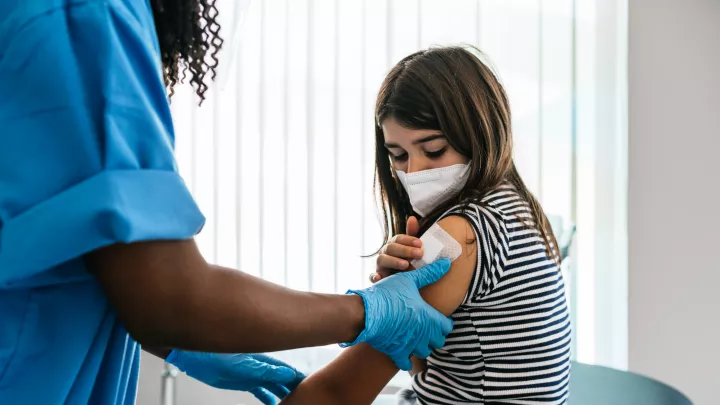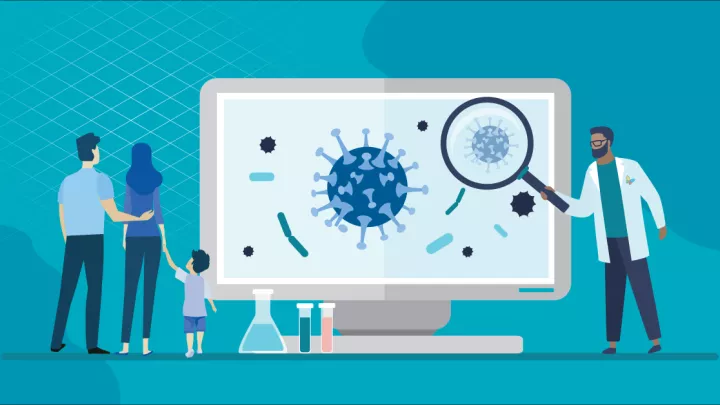
Here’s What Parents Need to Know About a Measles Outbreak
Quick facts:
- The first measles cases of the year were recently reported in Los Angeles County.
- Measles is highly contagious, so vaccinating your child is important to decrease the risk of infection.
- The measles vaccine is safe and extremely effective in preventing severe infection.
- Outbreaks have become more common due to lower vaccination rates.
- In the event of an exposure, babies who are not yet vaccinated, or children who are immunocompromised, should contact their doctor to explore preventative options.
Measles is one of the world’s most contagious diseases. Thankfully, modern medicine provides an extremely effective tool against outbreaks, severe illness, and death.

A recent study estimates that, over the last 50 years, the measles vaccine has helped prevent more than 93 million deaths globally. But while high vaccination rates nearly eliminated measles in the U.S. in the 2000s, outbreaks have become more common in recent years due to lower vaccination levels in some communities.
Michael Smit, MD, MSPH, is the Medical Director of Infection Prevention and Control in the Division of Infectious Diseases at Children’s Hospital Los Angeles. He’s spent his career exploring how infections spread, and how outbreaks can be prevented.
“If your goal is to avoid catching measles—and spreading it to others—the vaccine is your best bet,” he says. “I recommend the vaccine to everybody eligible to receive it.”
Here's what parents need to know about staying safe and healthy in a measles outbreak.
What is measles?
Caused by an airborne virus, measles is a potentially serious infection most often recognized by the rash that accompanies its flu-like symptoms.
A measles infection often includes:
- Fever
- Cough
- Runny nose
- Red, watery eyes
- Rash 3-4 days after symptoms begin
If you think your child might have measles, call the doctor to discuss the next steps.
What do measles cases look like in the U.S. and Southern California?
The Centers for Disease Control and Prevention (CDC) has reported more than 480 measles cases across 20 states as of Mar. 28, 2025. The vast majority of these cases are associated with five outbreaks, the most prominent being in Texas.
In Feb., the Los Angeles County Department of Public Health reported the county’s first measles case of the year. 7 more cases have been confirmed as of Mar. 31.
More than 75% of all reported cases in the U.S. are in infants, children, and young adults up to age 19.
“There is ongoing potential for worsening widespread outbreaks if contagious individuals with measles enter communities with low vaccination rates,” says Dr. Smit. “Measles is one of the most contagious diseases known to mankind.”
How does measles spread?
Measles spreads through respiratory droplets via coughing or sneezing. If your child has been near someone infected with the virus, it’s possible for them to catch it, and you can catch it as well.
Is getting measles that bad?
While most children recover, they can become quite sick for a week or longer and may even require hospitalization. Potential serious complications can include pneumonia and encephalitis (inflammation of the brain).
“Measles is not a benign infection, like a common cold, where you get it and there are no downstream or permanent risks,” explains Dr. Smit, noting that 1 to 3 in every 1,000 children who contract measles die. “Sometimes, these complications can occur years after an infection.”
How do I protect my family from measles?
The best protection against severe measles infection is two doses of the measles vaccine, typically given as the combined measles, mumps, and rubella (MMR) vaccine.
The measles vaccine is safe and provides highly effective, long-lasting protection. According to the CDC, two doses of the MMR vaccine provide 97% protection against measles, and one dose provides 93% protection.
Children should receive two doses of the vaccine. Typically, the first dose is given at 12–15 months of age and the second is given around ages 4–6 before starting school.
You will generally develop full protection against measles about a month after the vaccine is given. However, receiving the vaccine after exposure but before the onset of measles can still help reduce illness severity.
How is measles diagnosed and treated?
Your doctor may run blood, throat, and urine tests to confirm the diagnosis. Treatment for measles is largely supportive care. You will likely be instructed to drink fluids, rest, and stay home from school or work.
If you or your child has measles, it’s also likely your doctor will recommend you stay in close contact for several weeks to monitor for complications.
What is the risk of measles infection for vaccinated individuals?
The measles vaccine is highly protective. If your child is up to date on their vaccines, their risk of infection is low—even if they come into contact with an infected person.
Still, it’s important to communicate with your doctor and continue to monitor for symptoms and potential complications if your child has been exposed to someone with the infection.
Are there any side effects from vaccines?
Any injection can produce fever or pain at the site of the injection. These side effects can be managed with rest and Tylenol.
What are the most common concerns around measles vaccine safety? Are those concerns valid?
You may have heard claims surrounding the measles vaccine on social media, in internet communities, or from other parents. If you have questions or concerns, discuss them with your healthcare provider, since many of these claims have been studied and proven false.
Here’s what to know about some of the most common statements:
- Does the MMR vaccine cause autism? The MMR vaccine does not cause autism. This claim is based on an old study that has since been retracted by the scientific journal that originally published it due to fraudulent data.
- Does the MMR vaccine cause deaths? No. Conversely, based on data analyzed over many years across many studies, getting the MMR vaccine is the best way to avoid catching and spreading measles. The vaccine is also the most effective way to avoid hospitalization and death from measles.
- Is vitamin A treatment just as effective against measles? Vitamin A at any dose does not prevent or treat measles. It may be prescribed as an additional treatment in people who are or may be deficient in vitamin A before contracting measles. Excessive amounts of vitamin A can lead to toxicity, which involves headaches, diarrhea, and liver damage.
How do I know whether my child has had the measles vaccine?
Check with your child’s pediatrician if you’re unable to access vaccine records for your child or yourself to see if getting another measles vaccine is recommended.
How do I protect my child if they’re unable to be vaccinated?
The best way to protect a baby or immunocompromised child is to ensure that all family members, relatives, and household guests are fully immunized against measles (and other illnesses, including pertussis).
Heed public health warnings in your area. If your child has been exposed to measles, tell your child’s doctor immediately.
There are still steps that can be taken to protect your child from measles after being exposed. It may involve giving the child a dose of antibodies against measles but must be done soon after exposure and before onset of symptoms.
Is the measles vaccine expensive?
The cost of the vaccine is covered by most health insurance plans, and by programs such as Vaccines for Children. Visit the Los Angeles County Department of Public Health for more information.
We are traveling before my baby is the age doctors recommend the measles vaccine. What should I do?
Pediatricians advise that unless international travel is necessary, it’s best to postpone travel until children have been fully immunized. If you are traveling to an area experiencing a measles outbreak, infants can receive the measles vaccine as young as 6 months of age. This measles vaccine does not count as a routine immunization as it may not be as effective as when the child is 1 year of age or older. Your child will still need to get two further immunizations against measles once they’re old enough.


